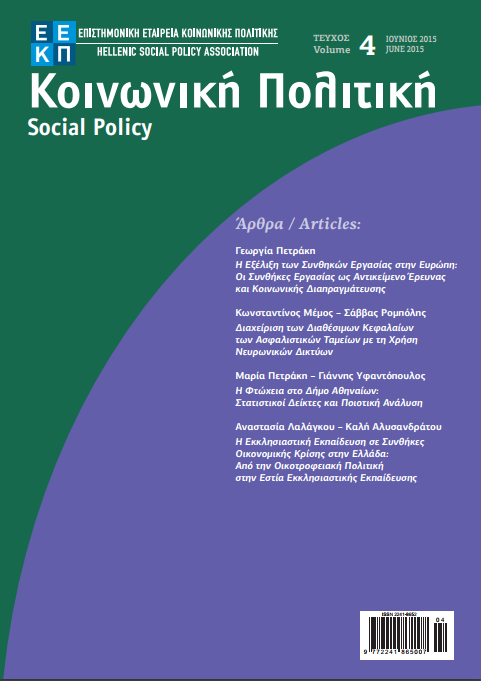Η Εκκλησιαστική Εκπαίδευση σε Περίοδο Οικονομικής Κρίσης στην Ελλάδα: Από την Οικοτροφειακή Πολιτική στην Εστία Εκκλησιαστικής Εκπαίδευσης
Abstract
In modern greek history “ecclesiastical education” [secondary and higher education for priests and future priests] co-exists with the institution of boarding houses in all its levels, since the beginning of the 19th century. The creation and development of educated clergy was expressly written in the relevant legislation. The latter regulates the structure, organization and function of boarding houses in ecclesiastical education. These boarding houses serve social purposes, besides pedagogical and learning/cognitive ones. In this context, previous and present provisions are analyzed, with emphasis on the law 3432/2006 “Structure and function of ecclesiastical education. In this article are presented briefly the context of the specific reform, mostly the framework of the State-Church relations, quantative elements regarding the application of the above mentioned law during the years 2007-2014 and comparative relative elements that regard the state grant in respective structures in greek universities. It is also examined the social dimension in the function of the “Estia of Ecclesiastical Education” (Hall of residence) in combination with the undergoing economical crisis. In the end are pointed out concerns on the perspectives of the institution.
Article Details
- How to Cite
-
Λαλάγκου Α., & Αλυσανδράτου Κ. (2017). Η Εκκλησιαστική Εκπαίδευση σε Περίοδο Οικονομικής Κρίσης στην Ελλάδα: Από την Οικοτροφειακή Πολιτική στην Εστία Εκκλησιαστικής Εκπαίδευσης. Social Policy, 4, 58–78. https://doi.org/10.12681/sp.10597
- Issue
- Vol. 4 (2015)
- Section
- Articles

This work is licensed under a Creative Commons Attribution 4.0 International License.
Authors who publish with this journal agree to the following terms:
Authors retain copyright and grant the journal right of first publication with the work simultaneously licensed under a Creative Commons Attribution Non-Commercial License that allows others to share the work with an acknowledgement of the work's authorship and initial publication in this journal.
Authors are able to enter into separate, additional contractual arrangements for the non-exclusive distribution of the journal's published version of the work (e.g. post it to an institutional repository or publish it in a book), with an acknowledgement of its initial publication in this journal.
Authors are permitted and encouraged to post their work online (preferably in institutional repositories or on their website) prior to and during the submission process, as it can lead to productive exchanges, as well as earlier and greater citation of published work.



